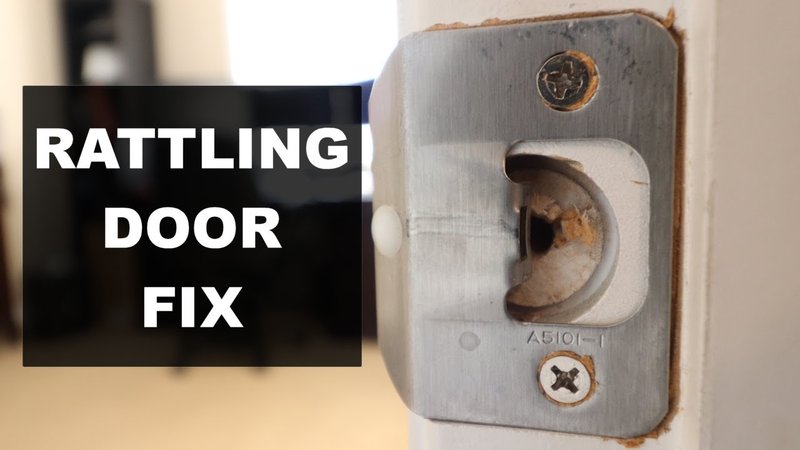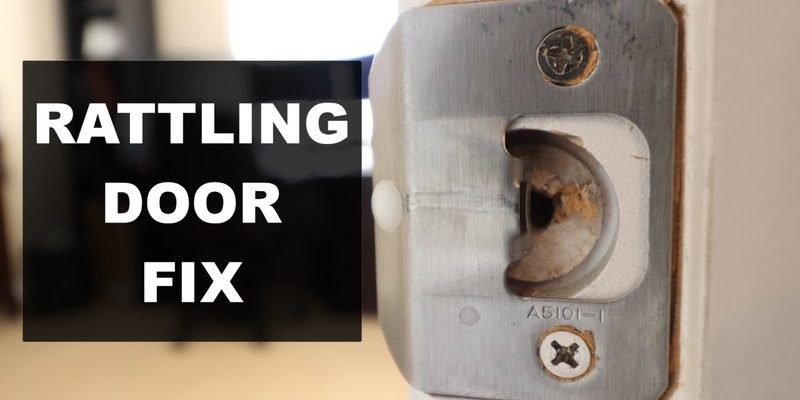
More often than not, a rattling door hinge is the result of loose parts. It’s similar to how a loose wheel on a bicycle can create a wobble. Your door hinges need to be secure for everything to function smoothly. Whether your door is an ornate wooden piece or a simple metal door, addressing that rattle can restore peace to your home and prevent further damage. Let’s dive deeper into the reasons behind that pesky noise and how you can fix it!
Understanding Door Hinges and Their Parts
Before tackling the rattle, it helps to understand the components of your door hinges. A standard hinge consists of two plates (known as leaves), a pin, and sometimes additional hardware like screws or washers. When correctly installed, the leaves sit flush against the door and frame, allowing for smooth opening and closing.
If any of these parts become loose or damaged, they can create unwanted movement. Think of it like a partnership. If one partner isn’t pulling their weight, the whole relationship gets shaky. The same goes for your door; if the hinge components are misaligned or loose, you’ll hear that obnoxious rattling sound.
Moreover, door hinges can come in various materials—like brass, stainless steel, or plastic. Each type has its own strengths and weaknesses in terms of durability and noise reduction. With time and wear, even the best hinges can develop issues, leading to that dreaded rattle.
Identifying the Source of the Rattling Sound
You might be wondering how to pinpoint the exact source of the noise. Start by carefully inspecting the hinge itself. Look for signs of wear, such as rust or corrosion, which can create gaps between the hinge parts. Additionally, try gently pushing the door while it’s closed. If you notice movement or misalignment, it’s a clear indicator of a loose hinge.
Another thing to check is the screws. If they’re not fully tightened, they can create that rattling effect. Sometimes, simply tightening these screws can restore harmony in your door’s movement. But if the screws are stripped or missing, you might need to replace them.
Finally, listen closely when you operate the door. Sometimes, the rattle could be coming from the latch or strike plate rather than the hinge itself. Gathering these clues will help you figure out what’s going on.
Common Causes of Loose Hinges
Let’s dive into what typically leads to loose door hinges. Over time, various factors can contribute to this problem:
- Wear and Tear: Just like anything else in your home, hinges can wear out from regular use.
- Humidity Changes: Changes in humidity can cause wood to expand or contract, affecting hinge alignment.
- Improper Installation: If hinges weren’t installed correctly, they might never sit right.
- Heavy Doors: Doors that are excessively heavy can put more stress on the hinges, leading to looser fittings.
- Vibrations: Activities near the door, like heavy footsteps or slamming doors, can gradually loosen hinges.
Knowing these common causes can help you take preventive action. For example, if you live in a humid area, you might want to consider using weatherproof hinges. Or if your door is particularly heavy, you might need to invest in sturdier, more robust hinges.
How to Fix a Rattling Door Hinge
Fixing a rattling door hinge is often easier than you’d think! Here’s a simple step-by-step guide to resolve the noise:
1. Gather Your Tools: You’ll need a screwdriver, possibly a drill, and replacement screws if necessary.
2. Tighten the Screws: Start by examining the screws on the hinge. If they seem loose, tighten them with your screwdriver. Be careful not to over-tighten, as this could strip the screws.
3. Check for Alignment: Close the door and check if the hinge is aligned properly. If it isn’t, shim it until it sits flush with the door and frame.
4. Replace Damaged Parts: If the screws are stripped or the hinge is damaged, it’s best to replace them. Head to your local hardware store and find equivalent replacements.
5. Lubricate the Hinge: After everything is secure, applying a bit of lubricant can help reduce noise even further. A little oil or silicone spray will do the trick.
Following these steps can significantly reduce or eliminate that annoying rattle.
Preventing Future Rattling Sounds
Preventing rattling hinges is all about maintenance. Here are some helpful tips to keep your hinges in good shape:
- Regular Checks: Make a habit of checking your door hinges every few months. It only takes a minute!
- Lubrication: Use a lubricant on the hinges at least once a year to minimize friction and wear.
- Weight Distribution: If your door is heavy, consider adding additional hinges to help distribute the weight.
- Quality Hardware: Invest in high-quality hinges that are designed for durability and longevity.
These simple maintenance practices can keep your door operating smoothly and prolong the life of your hinges, ensuring you won’t have to deal with that rattling sound anytime soon.
When to Call a Professional
While many hinge issues can be fixed with a little DIY effort, there are times when calling in a professional is the best route. If the hinge damage is severe or if you’re uncomfortable doing the repairs yourself, it’s wise to seek help.
Additionally, if the problem persists even after you’ve tried adjusting or tightening the hinge, it might indicate a larger issue, like a warped door frame or structural damage. A professional can assess the situation, give you advice, and ensure everything is in good working order.
That rattling door hinge doesn’t have to be a source of frustration. By understanding the mechanics behind your hinges and addressing common issues like loose parts, you can restore peace to your home. Regular maintenance, timely repairs, and a little DIY know-how can go a long way in keeping your doors functioning smoothly.
So, next time you hear that *clank*, you’ll know just what to do. Whether you choose to tackle it yourself or seek out a pro, you’re on the path to a quieter, more harmonious home. You’re now armed with the knowledge to silence those pesky hinges for good!
